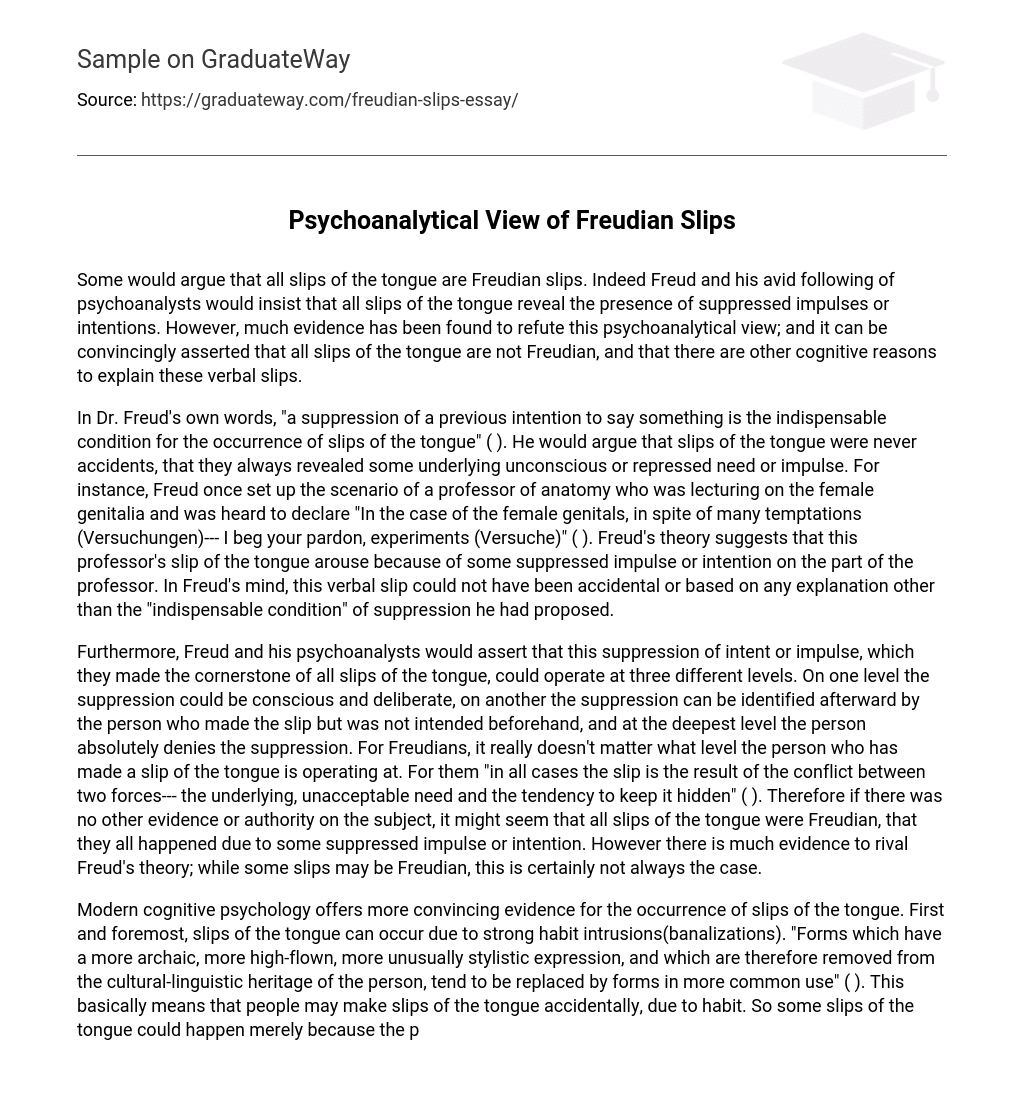The belief that all slips of the tongue are Freudian is held by some. According to Freud and his followers, such slips reveal repressed impulses or intentions. However, evidence contradicts this psychoanalytical perspective. It can be argued convincingly that not all slips of the tongue are Freudian and that there are alternative cognitive explanations for these verbal errors.
According to Dr. Freud, slips of the tongue occur when a previous intention to say something is suppressed. He believed that these slips were not accidental and instead revealed underlying unconscious or repressed needs or impulses. As an example, Freud mentioned a professor of anatomy who, while lecturing on the female genitalia, mistakenly used the word “temptations” instead of “experiments.” Freud theorized that this verbal error was a result of the professor’s suppressed impulse or intention. He believed that this slip of the tongue could not have been accidental and could only be explained by the theory of suppression he had proposed.
In addition, according to Freud and his psychoanalysts, the suppression of intent or impulse, which they considered the main factor behind all slips of the tongue, can occur in three different ways. The suppression can be conscious and intentional at one level, while at another level, the person who made the slip may recognize the suppression afterward, even though it was not intended beforehand. At the deepest level, the person completely denies the existence of any suppression. For Freudians, it is irrelevant which level the person operates on when making a slip of the tongue. They believe that “in all cases the slip is the result of the conflict between two forces—the underlying, unacceptable need and the tendency to keep it hidden” ( ). Hence, if there were no other evidence or authority on this matter, it could be presumed that all slips of the tongue are Freudian and occur due to some suppressed impulse or intention. Nevertheless, there is substantial evidence that challenges Freud’s theory. While some slips may indeed be Freudian, this is not always true.
Modern cognitive psychology presents more convincing evidence for slips of the tongue, which occur when strong habit intrusions or banalizations take place. Essentially, when a phrase or expression becomes deeply rooted in someone’s speech patterns, it is more likely to be substituted with a more commonly used alternative. This means that individuals may unintentionally make slips of the tongue due to their familiarity with a different word or phrase. For instance, many people mistakenly quote Shakespeare’s line “All that glisters is not gold” as “All that glitters is not gold”. This can be explained by our familiarity with the term “glitters” compared to “glisters”, leading us to use the more frequently employed term instead. Therefore, slips of the tongue resulting from banalizations or strong habit intrusions do not imply suppressed impulses or intentions as suggested by Freud but rather emphasize that not all slips of the tongue can be considered Freudian.
Contemporary cognitive psychology challenges the psychoanalytical notion that all slips of the tongue are Freudian by examining the Need System and the Intention System. The Need System operates independently of the Intention System through the utilization of the Word Store. This implies that a person may utter something based solely on a need, with or without intending to do so. For instance, imagine someone preparing for a dinner with a guest who has a prominent nose. They consciously remind themselves not to mention anything related to noses during dinner. However, during the actual dinner, instead of asking for salt, they unintentionally ask for the “nose”. According to Freudians, this slip would be attributed to a repressed desire to say “nose”. However, it is not necessarily the case. The slip could have occurred because the host needed to avoid embarrassment, rather than because of an unconscious intent to say the word “nose” as Freud would argue. Cognitive psychologists could argue that the slip happened because the word “nose” was primed in the host’s mind through “need priming”. In other words, the host attached significance to the word “nose” due to their fear and concerns that needed to be avoided. Furthermore, it could be argued that the host uttered the word “nose” due to strong habit intrusion.The word had been rehearsed excessively in his mind in order to prevent its utterance, but it accidentally slipped out. This slip was not caused by repressed intentions or impulses, which would be considered a Freudian slip. Therefore, Freud and the psychoanalysts do not provide the final explanation for all verbal slips.
Moreover, not all slips of the tongue are Freudian, as some may result from strong habit intrusions rather than suppressed intent and impulse. Additionally, while Freud’s theories on slips may be more intriguing (and certainly more sexual), they are not always accurate. Modern cognitive psychology provides more reliable, direct scientific evidence for the existence of slips of the tongue and demonstrates that Mr. Freud, to his possible chagrin, does not hold absolute authority in this area of psychology.





